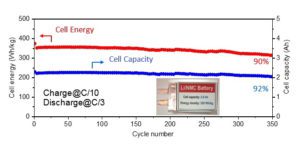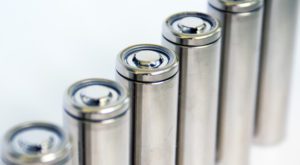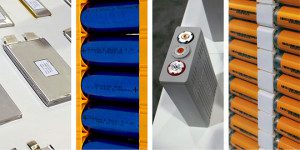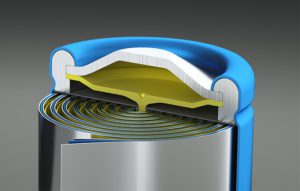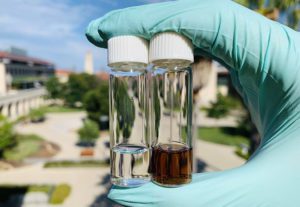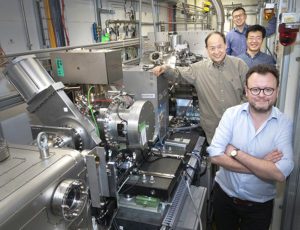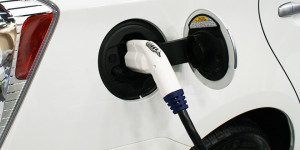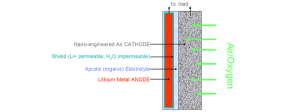Launched in 2017, the Battery500 Consortium is a multi-institution program working to develop next-generation lithium metal anode cells delivering gravimetric energy density of up to 500 Wh/kg. The Battery500 team is composed of scientists and engineers from four national laboratories and five universities. Two of the researchers on the team, Professor Stanley Whittingham of Binghamton… Read more »
Search Results Found For: "Battery500"
DOE awards $6 million to first crop of Battery500 Seedlings
The Battery500 consortium, led by the DOE’s Pacific Northwest National Laboratory (PNNL), intends to build a battery pack with a specific energy of 500 Wh/kg, which would more than double the 170-200 Wh/kg per kilogram in today’s typical EV battery. Part of the initiative is the “Seedling” program, which identifies new and risky battery research… Read more »
Funding available for Battery500 Seedling Projects
The DOE is issuing a funding opportunity (DE-FOA-0001629) for the Vehicle Technologies Office (VTO) of up to $19.7 million to support research and development of advanced vehicle technologies. The funding opportunity seeks projects in four areas, including Battery500 Seedling Projects. The VTO Battery500 Consortium has set a goal of doubling the specific energy of lithium… Read more »
Battery500 consortium aims to develop 500 Wh/kg battery pack
One of the Obama Administration’s recently announced initiatives to promote EV adoption is the Battery500 consortium, which will be led by Pacific Northwest National Laboratory (PNNL), and includes several other national laboratories and universities. The group will receive up to $10 million a year over five years from the DOE. The goal of Battery500 is… Read more »
Thinner anode strips could lead to longer lithium metal battery life
Researchers from the Pacific Northwest National Laboratory (PNNL) have increased the lifetime of a lithium metal battery to a record 600 cycles. The research was done through DOE’s Innovation Center for Battery500 Consortium. The work was published in the journal Nature Energy. The PNNL team found a way to increase the battery’s lifetime using 20-micron-wide… Read more »
Researchers develop novel battery electrolyte for lithium metal batteries
A new lithium-based electrolyte invented by Stanford University scientists could pave the way for the next generation of EVs. In a study published in Nature Energy, Stanford researchers demonstrated how their novel electrolyte design boosts the performance of lithium metal batteries. “Most electric cars run on lithium-ion batteries, which are rapidly approaching their theoretical limit… Read more »
DOE researchers identify cause of cathode degradation in nickel-rich materials
A team of scientists that includes researchers at the DOE’s Brookhaven National Lab and SLAC National Accelerator Lab has identified the causes of degradation in nickel-rich materials for lithium-ion battery cathodes, as well as possible remedies. Researchers at Brookhaven are part of a DOE-sponsored consortium called Battery500, a group that is working to triple the… Read more »
DOE awarding $19 million to 22 advanced vehicle technologies projects
The DOE is awarding $19.4 million to 22 new cost-shared research projects in the fields of advanced batteries, lightweight materials, emission control, and energy-efficient mobility systems. Fifteen of these are Phase 1 Battery Seedling projects, aimed at battery materials and approaches that complement the Battery500 Consortium’s research. Promising Phase 1 awardees will be competitively weeded… Read more »
New White House initiatives aim to promote EVs
The Obama administration, a reliable booster of electromobility, has announced a new package of measures aimed at helping to put more EVs on the road. While EVangelists may be disappointed that the package contains little in the way of new money or mandates, it will hopefully lay the groundwork for more cooperation among governments, private… Read more »
Two materials firms join IBM’s Li-air Battery 500 Project
IBM announced Friday that Asahi Kasei and Central Glass will join its Battery 500 Project team to collaborate on research into lithium-air batteries. The two companies have some very pertinent expertise, due to their existing work with lithium-ion batteries – Chemical manufacturer Asahi Kasei makes separator membrane, and Central Glass supplies electrolytes. The… Read more »




